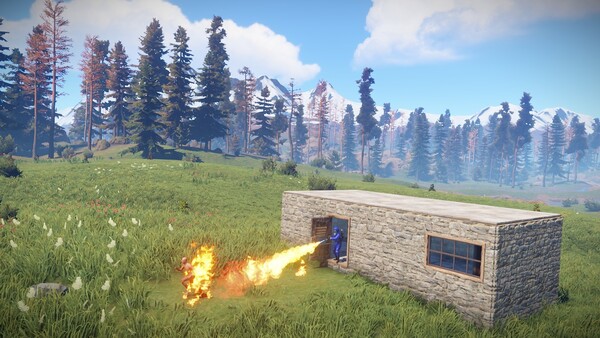Advertisement
Popular Now
Rust is a brutal multiplayer survival game that challenges players to navigate a post-apocalyptic world filled with danger and opportunity. The game's landscape is unforgiving, where the threat of other players looms large, wildlife hunts relentlessly, and the elements test your resilience. This guide aims to equip you with essential "how-to" strategies that will help you survive and flourish in the harsh environment of Rust. From your first steps to advanced survival tactics, each section will delve into the crucial aspects of gameplay.
1. Getting Started: Your First Steps in Rust
5. Navigating the Map: Exploring Rust’s Biomes
10. Staying Updated: Adapting to Game Changes
Introduction
In Rust, players are thrust into a world where survival hinges on resource management, strategic crafting, and player interactions. You start with nothing but a rock and a torch, and your journey begins from there. The goal is simple yet profound: survive against all odds. As you navigate through the game, understanding the mechanics and developing effective strategies is vital. Whether you're a newcomer or a seasoned player looking to refine your skills, this guide will provide you with the necessary insights to make your Rust experience both enjoyable and successful.1. Getting Started: Your First Steps in Rust
Understand the Basics
The first moments in Rust can be overwhelming. You’ll need to grasp the basic mechanics quickly. Gather resources, learn the crafting system, and familiarize yourself with the game’s environment.- Gathering Resources: The first step is to gather basic resources like wood, stone, and cloth. These are crucial for crafting your initial tools.
- Crafting Essentials: As you collect resources, use them to craft a Stone Hatchet and a Stone Pickaxe. These tools will significantly increase your resource-gathering efficiency.
Crafting Your First Tools
Your survival in Rust largely depends on how quickly you can craft useful tools. The right tools enable you to gather resources more effectively and defend yourself against threats.- Stone Hatchet: This tool is essential for gathering wood quickly. To craft it, you’ll need 200 wood and 100 stone.
- Stone Pickaxe: Vital for mining stone and ore, the Pickaxe requires 200 wood and 100 stone as well.
Prioritize Basic Needs
Surviving the first few days in Rust involves prioritizing your basic needs—food, water, and shelter.- Finding Food: Hunt animals like chickens or gather plants for food. Cooking food over a campfire restores your health and keeps you energized.
- Water Source: Locate a river or water body. Staying hydrated is crucial for maintaining your health and stamina.
2. Building Your First Shelter: The Foundation of Survival
Choosing the Right Location
Once you've gathered enough resources, building a shelter becomes your next priority. Selecting the right location is vital for your safety.- Hidden Spots: Look for secluded areas away from main roads and high-traffic locations to avoid detection by other players.
- Resource Accessibility: Ensure your shelter is close to resources like trees and stone to minimize travel time when gathering.
Constructing Your Shelter
Building your shelter is a simple but crucial step in your survival journey.- Foundation: Start by placing a foundation using wood or stone. A 2x2 foundation is a good start.
- Walls and Roof: Add walls around your foundation and a roof to protect yourself from the elements and enemies.
Securing Your Shelter
Once your shelter is built, securing it against potential raids is essential.- Door Locks: Craft a lock for your door to prevent unauthorized access. You can use a code lock for added security.
- Traps: Consider placing traps outside your shelter to deter attackers.
3. Gathering Resources: Efficiency is Key
Resource Locations
The environment in Rust is filled with various resources, and knowing where to find them is crucial for survival.- Wood: Gather wood from trees. Use your Stone Hatchet for faster gathering.
- Stone and Metal: Mine stones and ore deposits using your Stone Pickaxe. These materials are essential for crafting advanced tools and building upgrades.
Resource Management
Efficient resource management can mean the difference between life and death in Rust.- Inventory Organization: Keep your inventory organized. Separate materials for crafting, food, and tools to quickly access what you need.
- Crafting Queue: Utilize the crafting queue to maximize efficiency. Start crafting items while gathering more resources.
Farming and Foraging
As you progress, consider farming and foraging to ensure a steady food supply.- Planting Seeds: Gather seeds from plants and plant them around your shelter. They will grow into food sources over time.
- Animal Traps: Craft traps to catch small animals for food without expending arrows or resources.
4. Understanding the Crafting System: Essential Tools and Items
Crafting Overview
The crafting system in Rust is expansive, allowing players to create a wide variety of items that aid in survival.- Workbenches: Building a workbench unlocks advanced crafting options. Invest in a Level 1 Workbench as soon as possible to gain access to better items.
- Crafting Recipes: Familiarize yourself with important crafting recipes to streamline your resource gathering.
Essential Crafting Items
Certain items are crucial for survival and should be prioritized in your crafting efforts.- Campfire: Essential for cooking food and staying warm. Requires 200 wood and 10 stone.
- Storage Boxes: Use storage boxes to keep your items organized and secure. Each box requires 300 wood to craft.
Advanced Crafting
As you progress, aim to craft more advanced items to enhance your survival chances.- Weapons: Create weapons like the Bow and Arrow for hunting and self-defense.
- Armor: Craft armor pieces to protect yourself against enemy attacks.
5. Navigating the Map: Exploring Rust’s Biomes
Map Awareness
Understanding Rust's map is crucial for effective navigation and resource management.- Map Layout: Familiarize yourself with key areas like monuments, resource hotspots, and potential danger zones.
- Landmarks: Use landmarks to orient yourself while exploring. This will help you avoid getting lost.
Exploring Biomes
Rust features various biomes, each offering unique resources and challenges.- Forests: Abundant in wood and wildlife but can hide threats from other players.
- Deserts: Offer fewer resources but provide opportunities for scavenging.
Looting Monuments
Monuments are valuable locations filled with loot but often guarded by NPCs or other players.- Types of Monuments:
- Airfield: High-risk, high-reward area with excellent loot.
- Power Plant: Contains valuable resources but is heavily contested.
6. Combat Basics: Defending Yourself
Understanding Combat Mechanics
Combat is an inevitable aspect of Rust. Familiarizing yourself with the combat mechanics will prepare you for encounters.- Melee Combat: Understand how to engage in melee fights effectively. Use timing and positioning to your advantage.
- Ranged Combat: Learn to aim and shoot effectively with bows and firearms to defend against threats.
PvP Strategies
Player versus player (PvP) combat is common in Rust. Developing strategies to handle these encounters is essential.- Ambush Tactics: Use the environment to your advantage. Hide and ambush unsuspecting players to gain the upper hand.
- Cover: Always use cover during firefights to minimize damage taken.
Gear and Loadouts
Prepare different loadouts for various combat scenarios.- Early Game Loadout: Stick to melee weapons and bows until you find better gear.
- Mid to Late Game Loadout: Aim for firearms and armor to increase your combat effectiveness.
7. Forming Alliances: The Importance of Teamwork
Joining a Clan
Rust can be challenging alone, so consider joining a clan or group to increase your survival chances.- Finding a Group: Use forums, social media, or in-game chat to find players looking for allies.
- Establishing Trust: Build trust within your group through communication and shared goals.
Coordinated Raids
Teamwork can lead to successful raids and resource acquisition.- Planning Together: Coordinate with your team to plan raids on enemy bases or resource locations.
- Diverse Roles: Assign roles within your group, such as scouts, attackers, and defenders, for maximum efficiency.
Communicating Effectively
Effective communication is crucial for successful teamwork.- Voice Chat: Use voice chat to relay information quickly during tense situations.
- In-Game Commands: Learn and use in-game commands to relay critical information efficiently.
8. Defending Your Base: Security Measures
Base Defense Strategies
Securing your base is critical to preventing raids by other players.- Building Upgrades: Upgrade your base with stronger materials like stone and metal to increase its durability.
- Defensive Structures: Create walls, gates, and traps around your base to deter attackers.
Monitoring Your Base
Keep an eye on your surroundings to spot potential threats early.- Turrets: Install automated turrets around your base to fend off intruders.
- Lookout Points: Create elevated lookout points to monitor the area for approaching enemies.
Maintaining Your Base
Regularly check and maintain your base to ensure it remains secure.- Repair Structures: Use materials to repair any damaged parts of your base after raids.
- Restock Supplies: Keep your defensive gear and supplies stocked to be ready for any attacks.
9. Advanced Strategies: Raiding and Scavenging
Planning a Raid
Once you've established a solid foundation, you may want to consider raiding other players for resources.- Intelligence Gathering: Scout your target’s base to identify weaknesses before launching a raid.
- Timing: Choose the right time to raid, preferably when the target is offline or preoccupied.
Executing the Raid
Execute your raid with precision and teamwork.- Diversion Tactics: Use distractions to draw attention away from your main attack.
- Quick Escape: Have an escape route planned in case the raid goes wrong.
Post-Raid Strategies
After a successful raid, ensure you manage your new resources effectively.- Dividing Loot: Equally divide loot among your team to maintain trust and morale.
- Reinforcing Security: Use new resources to reinforce your base and prepare for potential retaliation.
10. Staying Updated: Adapting to Game Changes
Following Patch Notes
Rust is a game that receives regular updates. Staying informed on changes can enhance your gameplay experience.- Patch Notes: Regularly check the official Rust website or community forums for patch notes and updates.
- Community Forums: Engage with the community to discuss updates and strategies.
Adapting Your Strategies
As the game evolves, so should your strategies. Adapt to new mechanics and gameplay changes to maintain your competitive edge.- Experimentation: Try out new crafting recipes and strategies to see what works best for your playstyle.
- Learning from Others: Watch streams or guides from experienced players to learn new tactics.


















